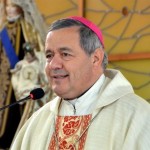Gerald, our multi-lingual smarty-pants friend, has translated Benedict XVI’s homily from last Sunday, and either he did a great job or the Holy Father did! :-) In any case, it’s well-worth the read. An excerpt:
Now we have to turn to the Gospel which speaks of the healing of a deaf-mute by Jesus. Here we once again find two aspects of the same topic. Jesus turns to the suffering, to those who have been forced to the edge of society. He heals them and thereby enables them to co-exist and co-decide and leads them into equality and fraternity. This speaks to us all: Jesus shows us the direction for our own deeds.
This process has a deeper dimension which the Church Fathers pointed out with emphasis in their exegeses. It also concerns us very much today. The Fathers speak about and to the people of their age. But what they say concerns us today, in a new manner. There isn’t just physical deafness that cuts off people from social life.
There is a hard-of-hearing towards God which we suffer from in this age. We simply cannot hear Him anymore – there are too many other frequencies in our ears. What is said about Him seems pre-scientific, no longer fitting for our time. With this hard-of-hearing, or even deafness, towards God we naturally lose our ability to speak with and to Him. Because of that, we lack a decisive perceptive faculty. Our internal senses are threatening to die off. With this loss in perception the radius of our relation to reality is drastically and dangerously curtailed.
The space of our live is reduced in a threatening manner. The Gospel tells us that Jesus put his fingers in the ears of the deaf man, with some saliva, and said “Ephata – open!” The Evangelist has preserved the original Aramaic word for us that Jesus spoke and thereby leads us straight into the moment it happened.
What is recounted is unique and still does not belong to a distant past: Jesus does the same in a new manner today, over and over again. In baptism, Jesus performs this gesture of touching and says Ephata – open yourself to be able to listen to God. By that he also gives us the ability to speak with/to God.
You’ll want to read the whole marvelous address to the age. Gerald also translated the pope’s homily for Vespers:
The second answer to the question where to find Jesus, (John of Patmos) gives to us once more in codified language. He says that the Lamb leads many people from all cultures and peoples to the sources of the water of life. Without water, there is no life.
The people whose home bordered the desert were well aware of that. For them, the water of wells became a symbol of life in general. The lamb, ie Jesus, leads them to the source of life. To this sources belongs Holy Scripture, in which God Himself speaks to us and says how to live properly. To this sources belongs even more however.
The source, the wellspring itself is Jesus, in whom God gives himself to us. He does this first and foremost in Holy Communion, in which we can drink directly at the source of life: He comes to us and unites with every one of us. We can see it: Through the Eucharist, the Sacrament of Communion, a communion is formed above all borders and languages and we can see it right here – Bishops of all parts of the world and languages are here with us – through Communion, the worldwide Church forms Herself, in whom God lives with and talks to us.
That is how we are supposed to receive Holy Communion: as an encounter with Jesus, with God Himself who leads us to the sources of the true life.
I like Benedict. A lot. He is a born teacher and he uses words even I can understand…











